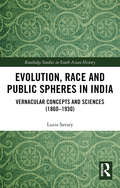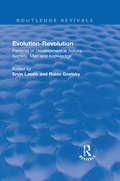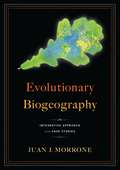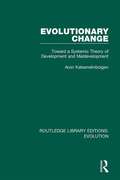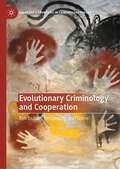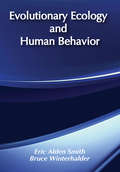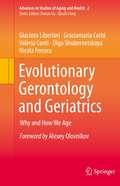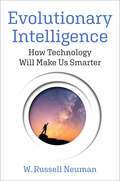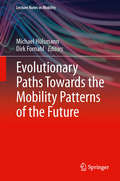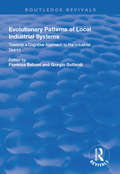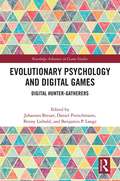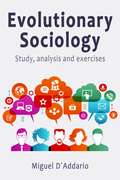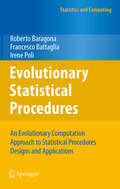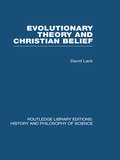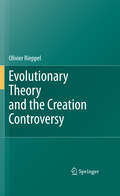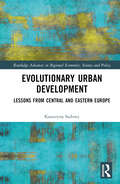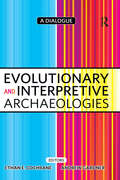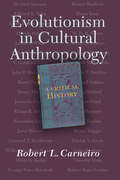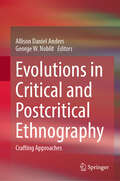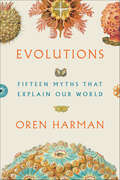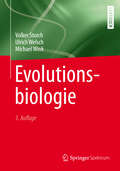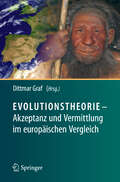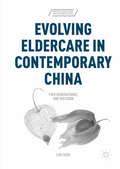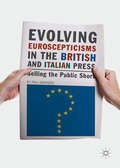- Table View
- List View
Evolution, Race and Public Spheres in India: Vernacular Concepts and Sciences (1860-1930) (Routledge Studies in South Asian History)
by Luzia SavaryThis book provides an in-depth exploration of South Asian readaptations of race in vernacular languages. The focus is on a diverse set of printed texts, periodicals and books in Hindi and Urdu, two of the major print languages of British North India, written between 1860 and 1930. Imperial raciology is a burgeoning field of historical research. So far, most studies on race in the British Empire in South Asia have concentrated on the writings of Western-educated elites in English. The range of Hindi and Urdu sources analyzed by the author provides a more varied and complex picture of the ways in which South Asians reinterpreted racial concepts, thereby highlighting the importance of scrutinizing the vernacular dimensions of global entanglements. Part I of the book centers on the debates on "civilization" and "civility" in Hindi and Urdu periodicals, travelogues and geography books as well as Hindi literature on caste. It asks if and in what respect the discussions changed when authors appropriated racial concepts. Part II revolves around the "science" of eugenics. It scrutinizes more popular genres, namely, early twentieth century advisory literature on "fit reproduction." It highlights how the knowledge promoted there was different from "eugenics" as the (mainly English-writing) founders of the Indian eugenic movements endorsed it. A fascinating analysis of the ways in which colonized elites have adopted and readapted racial concepts and theories, this book will be of interest to academics in the fields of Modern South Asian History, History of Science, Critical Race Studies and Colonial and Imperial History.
Evolution-Revolution: Patterns of Development in Nature Society, Man and Knowledge (Routledge Revivals)
by Ervin Laszlo Rubin GoetskyOriginally published in 1971 Evolution – Revolution is an interdisciplinary volume examining inquiry around the central topic of evolution and revolution. Containing contributions from a number of eminent academics of the time, the book addresses the meaning and application of evolution and revolution in the context, not of what things are, or even how they behave, but how they become. The broad interdisciplinary range of essays explores this concept through the idea of development and change and argues that both change, and development must be measured against concepts of flux and that which endures. The editors of the book suggest that these are the ‘invariants’ which contemporary thinkers are beginning to accept as the process-counterparts of Platonic ‘immutables’. Thus this volume examines the two ‘immutables’ of evolution and revolution. The book covers the concept through essays in science, philosophic concepts of rationalism and existentialism, art and religion.
Evolutionary Biogeography: An Integrative Approach with Case Studies (Crc Biogeography Ser.)
by Juan MorroneRather than favoring only one approach, Juan J. Morrone proposes a comprehensive treatment of the developments and theories of evolutionary biogeography. Evolutionary biogeography uses distributional, phylogenetic, molecular, and fossil data to assess the historical changes that have produced current biotic patterns. Panbiogeography, parsimony analysis of endemicity, cladistic biogeography, and phylogeography are the four recent and most common approaches. Many conceive of these methods as representing different "schools," but Morrone shows how each addresses different questions in the various steps of an evolutionary biogeographical analysis. Panbiogeography and parsimony analysis of endemicity are useful for identifying biotic components or areas of endemism. Cladistic biogeography uses phylogenetic data to determine the relationships between these biotic components. Further information on fossils, phylogeographic patterns, and molecular clocks can be incorporated to identify different cenocrons. Finally, available geological knowledge can help construct a geobiotic scenario that may explain how analyzed areas were put into contact and how the biotic components and cenocrons inhabiting them evolved. Morrone compares these methods and employs case studies to make it clear which is best for the question at hand. Set problems, discussion sections, and glossaries further enhance classroom use.
Evolutionary Change: Toward a Systemic Theory of Development and Maldevelopment (Routledge Library Editions: Evolution #5)
by Aron KatsenelinboigenOriginally published in 1997 Evolutionary Change addresses the somatic mechanism of change. Although astounding advances in molecular biology have opened up new engineering possibilities to shape our future in terms of "improving" the human species as well as eradicating all kinds of pathological characteristics of biological development, these possibilities pose potentially serious dangers. They arise primarily from the local nature of changes that are introduced and the impact of the environment on the overall development of the biological system. The book explores the biological mechanisms of change in their entirety – as they fit into the general dynamics of biological systems – and demonstrates the pitfalls of tackling change from a narrow perspective, using cancer as an example of certain pathological manifestations of these mechanisms of change.
Evolutionary Criminology and Cooperation: Retribution, Reciprocity, and Crime (Palgrave's Frontiers in Criminology Theory)
by Evelyn SvingenThis book develops an evolutionary theory of crime. Both evolutionary theory and neurocriminology are growing fields that are attracting more and more interest for criminologists and wider fields alike. This book summarises important readings that relate to retribution and punishment and presents some neurocriminological findings. In addition, the book introduces a new methodology for the study of crime: a game theory experiment adapted from the field of behavioural economics. Overall, the book synthesises the key crime literature, presents a new theory of crime in a new field of evolutionary criminology and the methodology to study it, and provides empirical results in support of the theory. For any evolutionary and neuroscientist interested in deviance, this book offers a new model which is testable using more complex methods such as MRI scanners and survival simulations.
Evolutionary Ecology and Human Behavior (Foundations Of Human Behaviour Ser.)
by Eric Alden Smith""à required reading for anyone interested in the economy, ecology, and demography of human societies."" --American Journal of Human Biology ""This excellent book can serve both as a text¼book and as a scholarly reference."" --American Scientist
Evolutionary Gerontology and Geriatrics: Why and How We Age (Advances in Studies of Aging and Health #2)
by Giacinto Libertini Graziamaria Corbi Valeria Conti Olga Shubernetskaya Nicola FerraraThis book provides concrete scientific basis that we can conceive the possibility of modifying or even completely canceling aging process, despite the fact that aging is commonly regarded as the result of the overall effects of many uncontrollable degenerative phenomena. The authors illustrate in detail the mechanisms by which cells and the whole organism age. Actions by which it is possible, or will be possible within a limited time, to operate for modifying aging are also debated.The discussion is conducted within the frame and the concepts of evolutionary medicine, which is also indispensable for distinguishing between the manifestations of aging and: (i) diseases that worsen with age, and (ii) acceleration of normal aging rates, caused by unhealthy lifestyle habits and other avoidable factors. The book also discusses the impact of aging on overall mortality and the strange situation that, according to official statistics, aging does not exist as cause of death.This book is a turning point between a gerontology and geriatrics conceived as the study and vain treatment of an incurable condition and one in which these disciplines examine the how and why of a physiological phenomenon that can be modified up to a possible total control. This means transforming the medical prevention and treatment of physiological aging from the greatest failure to the greatest success of medicine.
Evolutionary Intelligence: How Technology Will Make Us Smarter
by W. Russell NeumanA surprising vision of how human intelligence will coevolve with digital technology and revolutionize how we think and behave.It is natural for us to fear artificial intelligence. But does Siri really want to kill us? Perhaps we are falling into the trap of projecting human traits onto the machines we might build. In Evolutionary Intelligence, Neuman offers a surprisingly positive vision in which computational intelligence compensates for the well-recognized limits of human judgment, improves decision making, and actually increases our agency. In artful, accessible, and adventurous prose, Neuman takes the reader on an exciting, fast-paced ride, all the while making a convincing case about a revolution in computationally augmented human intelligence.Neuman argues that, just as the wheel made us mobile and machines made us stronger, the migration of artificial intelligence from room-sized computers to laptops to our watches, smart glasses, and even smart contact lenses will transform day-to-day human decision making. If intelligence is the capacity to match means with ends, then augmented intelligence can offer the ability to adapt to changing environments as we face the ultimate challenge of long-term survival.Tapping into a global interest in technology&’s potential impacts on society, economics, and culture, Evolutionary Intelligence demonstrates that our future depends on our ability to computationally compensate for the limitations of a human cognitive system that has only recently graduated from hunting and gathering.
Evolutionary Paths Towards the Mobility Patterns of the Future
by Dirk Fornahl Michael HülsmannThis edited volume presents new insights and challenges in the field of electric mobility in relation to new mobility and infrastructure concepts as well as to renewable energies. The book covers the socio-economic view on the topic as well as technical aspects and thus offers valuable knowledge for future business models. It primarily addresses practitioners and researchers in the field but may also be of use to graduate students.
Evolutionary Patterns of Local Industrial Systems (Routledge Revivals)
by Fiorenza Belussi Giorgio GottardiPulished in 2000, a selection of contributions presented in 1998 at the conference of Udine entitled, "The Development of Industrial Districts in Italy". The theoretical aim of the book is to explain the dynamic mechanism of the growth of Italian "industrial districts" shifting attention from "Marshallian industrial districts", where focus is not just on the decentralization of production among small-batch firms. Determinant factors explaining growth seem related to the ways in which firms explore the markets, learn tacit knowledge, network with subcontractors and make incremental innovations. In substance, the work offers a cognitive approach to the issue of industrial districts.
Evolutionary Psychology and Digital Games: Digital Hunter-Gatherers (Routledge Advances in Game Studies)
by Johannes Breuer Daniel Pietschmann Benny Liebold Benjamin P. LangeEvolutionary Psychology and Digital Games: Digital Hunter-Gatherers is the first edited volume that systematically applies evolutionary psychology to the study of the use and effects of digital games. The book is divided into four parts: Theories and Methods Emotion and Morality Social Interaction Learning and Motivation These topics reflect the main areas of digital games research as well as some of the basic categories of psychological research. The book is meant as a resource for researchers and graduate students in psychology, anthropology, media studies and communication as well as video game designers who are interested in learning more about the evolutionary roots of player behaviors and experiences.
Evolutionary Sociology
by Miguel D'AddarioThe most basic idea that underlies the concept of structure is that reality is not chaos. The skeleton of a living being is its bony system. The structure of a building is given in the way beams, floors, spaces, etc. are arranged. One of the most important influences in shaping the concept of structure in the sociology comes from Marxist thought in which there has been a sharper structural image of society.
Evolutionary Statistical Procedures
by Irene Poli Roberto Baragona Francesco BattagliaThis proposed text appears to be a good introduction to evolutionary computation for use in applied statistics research. The authors draw from a vast base of knowledge about the current literature in both the design of evolutionary algorithms and statistical techniques. Modern statistical research is on the threshold of solving increasingly complex problems in high dimensions, and the generalization of its methodology to parameters whose estimators do not follow mathematically simple distributions is underway. Many of these challenges involve optimizing functions for which analytic solutions are infeasible. Evolutionary algorithms represent a powerful and easily understood means of approximating the optimum value in a variety of settings. The proposed text seeks to guide readers through the crucial issues of optimization problems in statistical settings and the implementation of tailored methods (including both stand-alone evolutionary algorithms and hybrid crosses of these procedures with standard statistical algorithms like Metropolis-Hastings) in a variety of applications. This book would serve as an excellent reference work for statistical researchers at an advanced graduate level or beyond, particularly those with a strong background in computer science.
Evolutionary Theory and Christian Belief: The Unresolved Conflict (Routledge Library Editions: History & Philosophy of Science)
by David LackOriginally published in 1957. This book is concerned with the conflict between "Darwinism" as the Victorians called it, and Christianity, a conflict here re-stated in modern terms because it so vitally affects our understanding of human nature and human values today. The opening chapter describes the historical background. There is a short account of evolution and the argument over Genesis. The importance of natural selection is stressed, and rival theories as to the means of animal evolution are criticised. Discussions follow on whether the course of evolution has been random or determined, on the argument from design, death in nature, the biologist’s methods and the difficulties in evolutionary ethics.
Evolutionary Theory and the Creation Controversy
by Olivier RieppelEvolutionary theory addresses the phenomenon of the origin and diversity of plant and animal species that we observe. In recent times, however, it has become a predominant ideology which has gained currency far beyond its original confines. Attempts to understand the origin and historical development of human culture, civilization and language, of the powers of human cognition, and even the origin of the moral and ethical values guiding and constraining everyday life in human societies are now cast in an evolutionary context. In "Evolutionary Theory and the Creation Controversy" the author examines evolutionary theory from a historical perspective, explaining underlying metaphysical backgrounds and fundamental philosophical questions such as the paradoxical problem of change, existence and creation. He introduces the scientists involved, their research results and theories, and discusses the evolution of evolutionary theory against the background of Creationism and Intelligent Design.
Evolutionary Urban Development: Lessons from Central and Eastern Europe (Routledge Advances in Regional Economics, Science and Policy)
by Katarzyna SadowyDrawing on a range of disciplinary approaches, this monograph explores the drivers of urban development. Through an evolutionary lens, cities are shown to find a development path amidst an ever-changing landscape, sometimes facing extreme externalities such as wars and economic crises. Key themes covered include urban growth, decentralization, path dependence, institutional change, governance, entrepreneurship and culture. Detailed case studies of the history-rich metropolises of Berlin, Budapest and Warsaw allow the author to examine the adaptive abilities of cities in flux, and draw conclusions with broader international relevance. This monograph will be valuable reading for advanced students and researchers in urban economics, evolutionary economics, institutional economics and Central European studies.
Evolutionary and Interpretive Archaeologies: A Dialogue (UCL Institute of Archaeology Publications)
by Ethan E. Cochrane Andrew GardnerThis collection of original articles compares various key archaeological topics—agency, violence, social groups, diffusion—from evolutionary and interpretive perspectives. These two strands represent the major current theoretical poles in the discipline. By comparing and contrasting the insights they provide into major archaeological themes, this volume demonstrates the importance of theoretical frameworks in archaeological interpretations. Chapter authors discuss relevant Darwinian or interpretive theory with short archaeological and anthropological case studies to illustrate the substantive conclusions produced. The book will advance debate and contribute to a better understanding of the goals and research strategies that comprise these distinct research traditions.
Evolutionism In Cultural Anthropology: A Critical History
by Robert L. CarneiroExamines the history of evolutionism in cultural anthropology, beginning with its roots in the 19th century, through the half-century of anti-evolutionism, to its reemergence in the 1950s, and the current perspectives on it today. No other book covers the subject so fully or over such a long period of time.. Evolutionism and Cultural Anthropology traces the interaction of evolutionary thought and anthropological theory from Herbert Spencer to the twenty-first century. It is a focused examination of how the idea of evolution has continued to provide anthropology with a master principle around which a vast body of data can be organized and synthesized. Erudite and readable, and quoting extensively from early theorists (such as Edward Tylor, Lewis Henry Morgan, John McLennan, Henry Maine, and James Frazer) so that the reader might judge them on the basis of their own words, Evolutionism and Cultural Anthropology is useful reading for courses in anthropological theory and the history of anthropology. 0813337666 Evolutionism in Cultural Anthropology : a Critical History
Evolutions in Critical and Postcritical Ethnography: Crafting Approaches
by George W. Noblit Allison Daniel AndersMoving beyond traditional critical ethnography, postcritical ethnographies accept as a key premise that studies which are critical of the social world must also turn critique back on the ethnographer, the study, and its process. The book includes an introduction to the evolutions of critical ethnography and postcritical ethnography and exemplar chapters from contributors who engaged in long-term ethnographic studies. Accompanying each chapter is an introductory preface and margin notes created by the editors to underscore the methodological ‘moves’ made by each author. Addressing the distinct orientations critical and postcritical ethnographies take, the book illuminates how different authors think, enact, and represent their critical and postcritical/post-critical work. In this way the book is pedagogical within and across each chapter. Each contributor has produced a chapter that includes a brief summary of their respective long-term inquiry project with emphases on relation in the being, doing, and theorizing of qualitative research. Contributors discuss their navigation of commitments across the arc of their research and engage critical social theory, interrogating issues of power and ideology. Each chapter includes retrospective analytical reflections on the long-term ethnographic work contributors completed. The chapters address interpretivist commitments to emic analyses, metaphor, and representation and each contributor’s personal and professional commitments to equity and justice. The chapters engage critical social theories, crip horizons, critical race theory, and queer theory, as well as critical and queer pedagogies, de/colonialism, and post-humanism. A summary chapter addresses key issues in contemporary postcritical/post-critical qualitative research. The book is designed to prepare novice qualitative researchers to craft, conduct, and represent postcritical/post-critical qualitative research. The book provides guidance for researchers who are interested in social critique, equity, and justice and who seek to avoid the failures in the last quarter of the 20th Century of critical ethnography.
Evolutions: Fifteen Myths That Explain Our World
by Oren Harman“An absolute joy to read . . . it is Harman’s skill in blending contemporary science and traditional storytelling that makes this book truly brilliant.” —Randy Rosenthal, New York Journal of BooksWe no longer think, like the ancient Chinese did, that the world was hatched from an egg, or, like the Maori, that it came from the tearing-apart of a love embrace. The Greeks told of a tempestuous Hera and a cunning Zeus, but we now use genes and natural selection to explain fear and desire, and physics to demystify the workings of the universe.Science is an astounding achievement, but are we really any wiser than the ancients? Has science revealed the secrets of fate and immortality? Has it provided protection from jealousy or love? There are those who believe that science has replaced faith, but must it also be a death knell for mythology?Evolutions brings to life the latest scientific thinking on the birth of the universe and the solar system, the journey from a single cell all the way to our human minds. Reawakening our sense of wonder, Oren Harman uses modern science to create new and original mythologies. Here are the earth and the moon presenting a cosmological view of motherhood, a panicking mitochondrion introducing sex and death to the world. Science may not solve our existential puzzles, but like the age-old legends, its magical discoveries can help us continue the never-ending search.“Breathtaking . . . The processes of evolution are at times so huge and ungraspable for the mind—so magical—that they can perhaps only be fathomed through the language of myth . . . Brilliant.” —Karin Altenberg, Wall Street Journal“Harman is a marvelous intellectual companion.” —David B. Green, Haaretz
Evolutionsbiologie
by Michael Wink Volker Storch Ulrich WelschDie gut eingeführte "Evolutionsbiologie" von Volker Storch, Ulrich Welsch und Michael Wink liegt inzwischen in 3., sehr gründlich überarbeiteter und aktualisierter Neuauflage vor. Die Autoren schildern den bisherigen Ablauf der Evolution der Organismen durch die Jahrmillionen, die molekularen Grundlagen der Evolution und - unter verschiedenen Aspekten - die Evolution des Menschen und seiner nächsten Verwandten. Zahlreiche Exkurse, viele von renommierten Wissenschaftlern verfasst, erläutern besonders aktuelle Themen.
Evolutionsbiologie
by Michael Wink Volker Storch Ulrich WelschDie gut eingeführte "Evolutionsbiologie" von Volker Storch, Ulrich Welsch und Michael Wink liegt inzwischen in 3., sehr gründlich überarbeiteter und aktualisierter Neuauflage vor. Die Autoren schildern den bisherigen Ablauf der Evolution der Organismen durch die Jahrmillionen, die molekularen Grundlagen der Evolution und - unter verschiedenen Aspekten - die Evolution des Menschen und seiner nächsten Verwandten. Zahlreiche Exkurse, viele von renommierten Wissenschaftlern verfasst, erläutern besonders aktuelle Themen.
Evolutionstheorie - Akzeptanz und Vermittlung im europäischen Vergleich
by Dittmar GrafDie Evolutionstheorie hat sich in den letzten 150 Jahren von einer speziellen naturwissenschaftlichen zur universellen wissenschaftlichen Theorie entwickelt. Sie bezieht Phänomene von der Lebensentstehung bis zu den kulturellen und geistigen Entwicklungen des Menschen ein. Die Evolutionstheorie ist das Fundament der modernen Biologie. Dennoch ist sie bis heute die vermutlich umstrittenste Theorie der Menschheitsgeschichte. Ein großer Teil der Menschen in aller Welt lehnt sie bis heute vehement ab. Das Buch nähert sich diesem Phänomen, indem es einerseits einen interdisziplinären Einblick in die evolutionäre Forschung ermöglicht und damit Wissenschaftler aus unterschiedlichen Disziplinen die Möglichkeit bietet, über ihre Forschung zu berichten. Andererseits schildern Forscher aus verschiedenen europäischen Ländern die spezifischen Schwierigkeiten bezüglich der Akzeptanz der Evolutionstheorie.
Evolving Eldercare in Contemporary China
by Lin ChenWith an increasing number of elders moving into nursing homes, the shift from family to nursing home care calls for an exploration of caregiving decision-making in urban China. This study examines how a rapidly growing aging population, the one-child policy, and economic reform in urban China pose unprecedented challenges to the country's ingrained tradition of family caregiving. It presents interviews of matched elders and their children from a government-sponsored nursing home in Shanghai and analyzes the decision-making process of institutionalization. This book offers fresh insight into the evolving culture and arrangements of caregiving in contemporary Chinese society, illuminating the diverse needs for long-term care of Chinese elders-the world's largest aging population-in the coming decades.
Evolving Euroscepticisms in the British and Italian Press
by Paul RowinskiThis book argues that the discursive construction of the EU in national newspapers is pivotal in creating an environment of Euroscepticism. The volume challenges the persuasive, manipulative and prejudicial language that is sometimes peddled in the influential UK Murdoch and Italian Berlusconi press, using the main focus points of the key Eurosceptic triggers of the € the subsequent national economic crises; and immigration, investigated through major events covered over two decades, including the UK's recent Brexit vote and Italy's constitutional crisis. Rowinski looks at the latest chapter of Euroscepticism: the increasingly key protagonists of the UK Independence Party and Italy's Five Star Movement, who want to take Britain out of the EU and Italy out of the euro. This book offers a rigorous academic analysis presented in an accessible style to experts and laypersons alike, exploring concrete articulations of Euroscepticism in the press.
